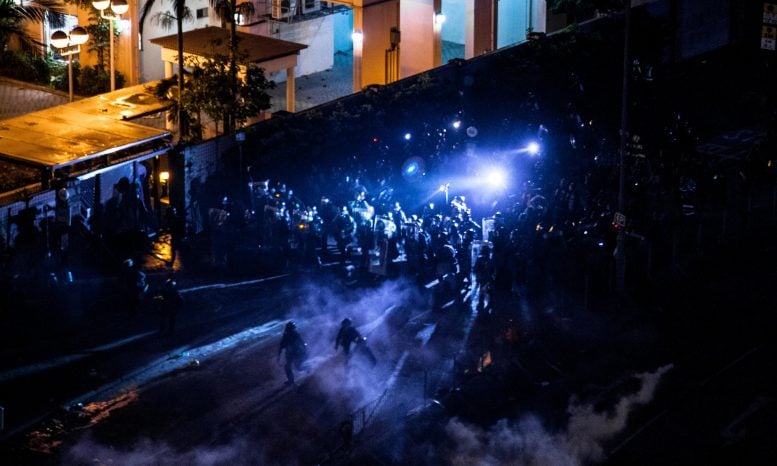The use of tear gas is rightfully banned in warfare and should equally be banned as a riot-control agent in law enforcement contexts.
The use of tear gas — particularly CS gas — as a riot control agent, cannot be reconciled with respect for fundamental human rights and should therefore be banned entirely in international law, the University of Toronto’s International Human Rights Program (IHRP) says in a report released today. Lawmakers at all levels of government should act to put forward legislation that bans use of the chemical weapon, eliminates existing stockpiles, and prohibits import, export, and manufacture.
The use of tear gas has increased worldwide, quickly becoming a weapon of choice for policing assemblies from Iran to Hong Kong to the United States. The boom in its use by law enforcement for protests and crowd control has resulted in a corresponding expansion of the largely unregulated global market for its trade, demand for which is expected to continue growing. Used as an area weapon, tear gas is inherently indiscriminate and is frequently abused when deployed against peaceful assemblies, in enclosed spaces, in excessive quantities and against vulnerable populations. It cannot distinguish between the young and the elderly, the healthy and the sick, the peaceful and the violent. Its deployment can also cause myriad health harms, including severe injuries and death.
“Tear gas is not a relatively benign method of crowd control. Its deployment effectively crushes the right to freedom of protest and assembly,” said Vincent Wong, William C. Research Associate at the IHRP and co-author of the report. “Studies are showing that long-term exposure in the form that we are seeing with protest policing leaves those affected at higher risk for a host of illnesses, including contracting respiratory illnesses such as COVID-19.”
The report, “The Problematic Legality of Tear Gas Under International Human Rights Law,” explores the deficient legal underpinnings and detrimental practical implications of the state of international human-rights law with respect to the use and abuse of tear gas. Although tear gas is banned in warfare under the Chemical Weapons Convention, an exemption for the use of riot control agents for law enforcement purposes was negotiated during the drafting process in order to secure a greater number of ratifying state parties.
“While international guidance governing the use of tear gas exists, these soft law instruments have shown to be largely ineffective in constraining misuse of tear gas or in protecting fundamental rights,” said Maija Fiorante, IHRP Summer Fellow and co-author. “Under international law, any use of force by law-enforcement authorities must abide by the principles of necessity and proportionality, but tear gas is hardly ever used in accordance with such principles.”
In addition, there are no international agreements governing the trade and manufacture of tear gas. Consequently, the global market for tear gas is largely unregulated and outside the scope of accountability. There are no common standards for the composition of tear gas. Canisters come in different shapes and sizes and contain an array of toxic chemicals. In many cases, it is difficult to know what combination of chemicals is inside, its level of toxicity, and whether its safety has been tested prior to sale.
The report also tracks how international norms are starting to shift with respect to tear gas. Increased efforts are being made by international rights groups and the United Nations and European Union to restrict the use and trade of tear gas. Countries are passing legislation to ban exports to other jurisdictions where tear gas is being frequently abused to crack down on protests in a punitive fashion and efforts are being made to pass legislation and moratoriums to ban the use of tear gas by police forces domestically. Regional courts have also made rulings that use of riot-control agents in certain circumstances may violate prohibitions on torture and cruel and inhumane or degrading treatment.
In Canada, MP Matthew Green has sponsored a petition calling for a nationwide ban on the use of tear gas, the destruction of stocks of tear gas currently owned by the police and armed forces, prioritization on de-escalation tactics over dispersal and arrest tactics in crowd control, and an investigation into the May 31, 2020 use of tear gas by police in Montreal on an anti-Black racism demonstration.
“The assumption has always been that tear gas is necessary to avoid use of more lethal weapons,” said Natasha Williams, IHRP Summer Fellow and co-author. “But this is a red herring. Banning tear gas under international law will force police to redouble their de-escalation efforts, as well as less harmful and less indiscriminate crowd control strategies.”










Abusus non tollit usum.
“The use of tear gas — particularly CS gas — as a riot control agent, cannot be reconciled with respect for fundamental human rights”. Human rights are not the realm of science, but are a philosophical concept. Moreover, in the scientific worldview, informed by the theory of evolution, “rights” are an abstraction of human reason and a purely relative social device, not a biological fact; rights do not exist objectively in nature. Ergo, why on earth are you supposing that you can tell someone else what is or is not acceptable in controlling crowds? Who are you to force your personal values on anyone else? Not staying within the boundaries your area of expertise brings your credibility into question.
Peaceful protestors and vulnerable populations should leave as soon as any indication of violence breaks out ! Eliminating the use of tear gas only assures more debilitating tactics for crowd control, such as non-lethal projectiles and hand to hand combat. Perhaps a better approach would be targeting the violent protestors with a sound Education instead of the Extreme liberal minded BS that you churn out at the University of Toronto like this article. Nobody likes to see collateral damage.